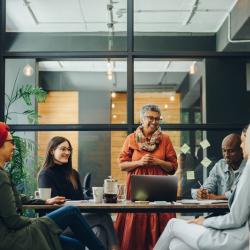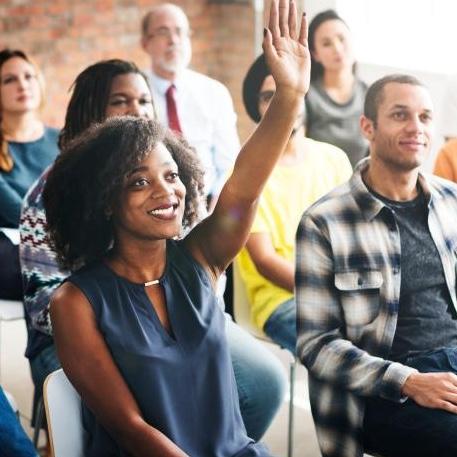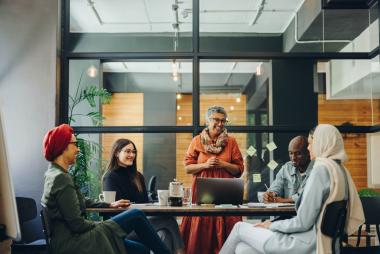Relational Partnership
Instead of our current model of transactional management where government dictates to marginalized groups how they should interact with government services, relational partnership includes the affected communities in every decision.


How does Washington State achieve belonging? What steps do we have to take to get to a place where everyone in Washington feels like they belong?
These 7 Pit Stops are foundational as we work towards achieving Pro-Equity Anti-Racism (PEAR) outcomes and making Washington state a Belonging State.
It will take the work of us all to actualize belonging and these 7 steps will aid us in making belonging a reality for everyone. Stay tuned as we continue to build upon this amazing foundation! Join us in transforming Washington to a state where everyone belongs. Together we will achieve equity and justice for all, now and for generations to come.
Relational Partnership One-Pager PDF (has accessibility tags)
The version with accessibility tags is recommended for any users using screen readers, Braille, or other assistive technology.
Relational Partnership One Pager PDF (no tags)
This is a version without accessibility tags.

What is Relational Partnership?
Relational partnership is a new approach to how state government operates that centers the needs and values of marginalized people in Washington State. Instead of our current model of transactional management where government dictates to historically and currently marginalized groups how they should interact with government services, relational partnership includes the affected communities in every decision.

Why Relational Partnership?
Relational partnership addresses the historical and current inequities that have deprived many communities in Washington State of their protected rights. When state government operates through a lens of relational partnership, all people who are affected by legislation, policy, and action are included in the decision-making process. The result is a more equitable distribution of power that centers the needs and values of the most marginalized people. This also increases government efficiency because resources can be allocated to the communities that need them the most, in the ways that benefit them the most.

How Do We Support Relational Partnership?
Relational partnership requires new ways of being. The framework we present below consists of the interpersonal skills and values that foster relational partnership. Relational partnership is a practice and perspective that can be embedded in both personal interactions as well as agency policies. We encourage you to download the guide to relational partnership below and seek ways of embedding these principles in all areas of your work.
About the Relational Partnership Guide
This guide was created as a resource to embed relational partnership in how Washington State government operates, with the intent of addressing past harms and current inequities in Washington State. In order to achieve Pro-Equity Anti-Racism (PEAR) outcomes, we must be relational.
In today’s work environment, it is critical that we lean in and explore ways to build trust, practice accountability, self-reflection, vulnerability, inclusion, and belonging in our work relationships. Building these traits will not only help you work better with your colleagues but with the communities you serve.
In this interactive workbook, we will explore strategies that can help you build and sustain the skills and values that lead us on our journey to a belonging state. Thank you for choosing to take this journey with us to make Washington a true belonging state!
View and Download the Relational Partnership Guide

The Seven Pit Stops Toward a Belonging State
Trust is built over time. We cannot assume we already have it. Trust is foundational to co-creation and allows us to show up as our authentic selves. Trust is what gives us confidence when engaging with people and reassures that we treat one another respectfully. Remember, trust is built out in the open, not behind closed doors.
Being vulnerable means creating an environment where individuals feel safe to take risks, share their ideas, and be authentic without fear of judgment or reprisal. It encourages open communication, trust, and co-creation among team members. Vulnerability reflects psychological safety in workplace culture.
Healing takes place when we take responsibility for our actions, understand the harm we’ve caused, and create opportunities to redeem ourselves. Healing is vital to move toward our future. We must take ownership of the harms created and continue to put in the work to create a better environment for generations to come.
Changing mindset begins internally and requires self-reflection to change old behaviors, patterns, and thoughts. Mindset also requires a willingness to embrace new perspectives to empower an inclusive environment.
We must utilize the lived experiences of those in the community and co-create solutions that benefit those most affected. In order to be truly equitable, community must be at the center of all our work.
Pivoting our focus to the impact and moving with purpose to continuously incorporate pro-equity anti-racism (PEAR) values in every-thing we do. PEAR values are: justice, access, Ubuntu, equity, love, dignity, and belonging.
Accountability is about doing the work of self and organizational reflection to understand how we play a role in oppressive systems and realigning to create pathways for change and healing. When we reflect on our own biases and lived experiences that differ from others, we are able to serve our communities better.
